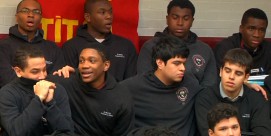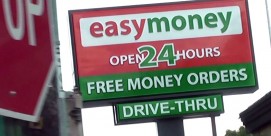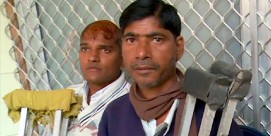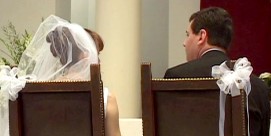In This Episode << SLIDE LEFT TO SEE ADDITIONAL SEGMENTS
Survey on American Catholics
BOB ABERNETHY: A new Vatican document this week called for sweeping changes in the global financial system in order, it said, to put “the common good” at the center of economic activity. One of the most controversial proposals would create an international political authority that would have broad power to regulate financial markets. The document was issued by the Pontifical Council for Justice and Peace. It said changes are needed to address the quote “inequalities and distortions of capitalist development.”
Giving to the poor was one of many issues raised in a new survey of U.S. Catholics. According to the results, 60% now believe you can be a good Catholic without donating time or money to the poor. That number was 44% in 2005. The survey also found that a majority of Catholics now believes that individuals – not church authorities – should be the ones to make decisions about abortion, homosexuality and other social issues.
Joining me now are Kim Lawton, managing editor of this program and Kevin Eckstrom editor of Religion News Service. Welcome to you both. Kevin can you explain this astonishing figure that 60% of those surveyed, 60% of Catholics in this country say, they can be good Catholics without at the same time giving money to the poor or giving time to helping the poor.
KEVIN ECKSTROM (Editor, Religion News Service): It’s one of the great sort of paradoxes that this survey picked up. The other figure that was worth mentioning here is that two out of three Catholics said that helping the poor and the church’s teaching on the poor is important to me as a Catholic. So, they see it as core to the Catholic identity but it doesn’t necessarily mean they’re actually going go out and do something about it. And it’s sort of broadly reflective of this trend that the survey picked up that I’m a Catholic and I’ll go to mass because I want the Eucharist, I want the liturgy, I think that the core teachings are important but I am not going to do it because some bishop somewhere tells me that I have to. Weekly mass attendance is down to like 30% and the number of people who go to church once a month is actually higher than people who go to weekly. So people are doing it on their own terms.
KIM LAWTON (Managing Editor, Religion & Ethics NewsWeekly): And, also, in that survey, it did find that a big majority, 88% of Catholics, said that helping the poor, it was meaningful for them that their church had concern for the poor. It’s just, again, what the church says and does and how it translates into individuals’ lives. As one author of the survey said, American Catholics like being Catholic but they like to do it on their own terms, as well.
ABERNETHY: And the confirmation of some other long trends. For instance, making up your own mind about social and moral concerns rather than taking instructions from the hierarchy.
ECKSTROM: Yeah the big number there was on homosexuality, which is sort of a flashpoint issue but I think it’s telling. The number of people who say the church and church leaders should have the final word on the morality of homosexuality or same-sex marriage has dropped by half in the last 25 years. No other issue has seen that sort of shift but I think it’s really telling where people say, you know what, I’ve got gay friends, I’ve got a gay brother or gay neighbors. There’s a disconnect here between what the church is telling me and what my life experience is telling me and so I’m not going to necessarily go along with the church on this one.
ABERNETHY: And what are the implications of a third of Catholics now being Hispanic?
ECKSTROM: Well, within a generation they are likely to be the majority of the Catholic Church in the United States. And what that means, in practical terms, is that Spanish language mass might become the norm and English language mass is going to be sort of what they do on the side, on Saturday nights.
LAWTON: And some of these economic issues may come to the fore, as well. And again, going back to the Vatican document, I mean, a lot of the input for that came from outside the United States as church leaders from Europe, but also Latin America, have contributions about what the church has to say about the poor. And sometimes American Catholics weren’t, there was a lot of mixed reaction among American Catholics to that Vatican document. I mean some religious conservatives, Catholic conservatives, really tried to dismiss it a little bit and say it didn’t have the full force of a papal teaching but it certainly did quote from popes who have raised concerns about the poor.
ABERNETHY: And reminded everybody about how very liberal the church teachings are about how the poor should be treated.
LAWTON: Catholic social teaching does have what many people consider very liberal values when it comes to the poor. Some of the folks this week tried to associate this document with the Occupy Wall Street folks and the Vatican officials said this was not a direct response to Occupy Wall Street. But I saw a lot of similar language. The Vatican document criticized excessive greed as being sinful and evil. Certainly that’s a big theme with Occupy Wall Street. Talked about social inequities being morally wrong and again, that’s in the Vatican document.
ABERNETHY: Many thanks to Kim Lawton and Kevin Eckstrom.







